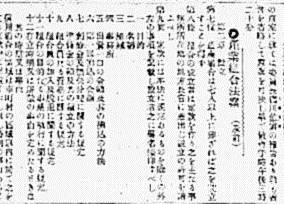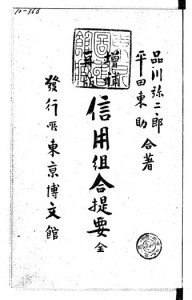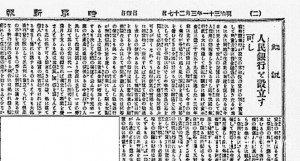The Pioneer Shinagawa’s wish came true

Editorial of Tokyo Nichinichi Shimbun on February 11, 1891, which reported about the sangyokumiai bill
After scrapping the shinyokumiai bill along with the dissolution of the House of Representatives in 1891 (Meiji 24), the initiative of submission of the sangyokumiai bill was moved to the Ministry of Agriculture and Commerce from the Ministry of the Interior. Makers of the sangyokumiai bill were Saku Watanabe, farming manager of the Ministry of Agriculture and Commerce, and Hajime Oda, Counsellor of the Ministry of Agriculture and Commerce, who opposed the Tosuke Hirata and Yajiro Shinagawa who had submitted the shinyokumiai bill.
Watanabe and other stuff tried translating the words representing the cooperatives in Germany “Erwerbs- und Wirtschafts-Genossenschaften” into “Seisan oyobi keizaikumiai (Livelihood & economy-cooperatives)” in Japanese. However, Hirata refused their translation because of inconvenience to call due to too long name and decided simple translation, ”sangyokumiai (san=economy, gyo= Livelihood, kumiai=cooperatives)”
Thus, the primary sangyokumiai bill was submitted to the 30th Imperial Diet. The bill included articles for 5 kinds of business such as credit, purchasing, sales, manufacturing (production), utilization. In the bill, consumption cooperatives, land use cooperatives (factories, hospitals, etc.), and service cooperatives were excluded. The range of contents of the bill was narrower than range of contents of not only present nogyokyodokumiai (Agricultural cooperatives) law, but also German cooperatives law “die privatrechtliche Stellung der Erwerbs- und Wirtschafts-Genossenschaften” that Japan referred.
The book “History of development of sangyokumiai (cooperatives) 1st volume ” pointed regarding the bill, ” The primary sangyokumiai bill aimed for encouragement of implementation of capitalism from the point of view of governments’ industrial development policy. There was no article for consumption cooperatives for working class and farmers’ land use cooperatives. The bill had even feeling of recession in comparison with scrapped shinyokumiai bill. ”
On the other hand, polemicist of capitalism promotion objected to legislation of the bill claiming that “sangyokumiai (cooperatives) inhibits the commercial development”.
Although Hirata having a seat in the House of Lords agreed, the Diet end was imminent after two days. Some lawmakers claimed, “The contents of the bill should be limited to only shinyokumiai (credit cooperatives)”. Once Hirata also agreed with that opinion. However, one government committee urged, “The government does not agree with the sangyokumiai (cooperatives) bill to be changed into a piece of shinyokumiai bill.” Due to his word, deliberation on the sangyokumiai bill ended with unfinished, once again the bill was scrapped.
Newspaper reports promoted establishment

“Shinyokumiai-teiyo (Essence of credit cooperatives)” written by Shinagawa and Hirata, which wrote an easy-to-understand credit cooperatives theory
The modification of the bill was again entrusted to Ministry of Agriculture and Commerce. In the summer of 1899 (Meiji 32), the bureaucrats of the ministry rented a small house in Katasekaigan of Kanagawa Prefecture. They were going to write the modified bill while camping there. However, camped life did not promote their work due to much time to indulge in sea bathing, the game of Go, and chat every day. Therefore, they went back to Tokyo and started the survey planning from the early morning.
Being aware of the sangyokumiai (cooperatives) bill that the Ministry of Agriculture and Commerce submitted, “Shinyokumiai Teiyo” written by Hirata and Shinagawa in 1896 (Meiji 29) referred to the purchasing and sales cooperatives. While hoping the enactment of the shinyokumiai (credit cooperatives) law, they also recommended the establishment of the purchasing and sales cooperatives.
◇
On the other hand, the newspaper such as “Yomiuri” “Tokyo Nichinichi” published the articles regarding cooperatives from June to August in 1893 (Meiji 26). The papers introduced various situation of spreading cooperatives in Shizuoka and Yamagata prefecture including Kakegawa shinyokumiai (credit cooperatives) so as to play the role of propaganda of cooperatives.
The papers did not stop at the mere introduction movement. They began to put out the editorials including the claim. “Jijishinpo” on October 20, 1897 (Meiji 30), put out an editorial entitled “we desire the establishment of shinyokumiai (credit cooperatives)”. The paper on March 27 next year also put out another editorial entitled “The People’s Bank should be founded.” In the editorial, the paper intended, “Shinyokumiai should be based on mutual trust of cooperatives members. If so, its implementation can not be completed by only a piece of legislation,” and concluded that influential people of the region had to be aware of its necessity and make efforts on establishment of cooperatives.
Such new movement of private sector had seemed to make some influence on the planning work at the Ministry of Agriculture and Commerce and the deliberations at the Diet.
The government submitted the (second) sangyokumiai bill to the imperial diet in February 1900 (Meiji 33), the bill was passed (promulgated date was March 7, 1900, and enforcement date was September 1, 1900). In the law, the article for consumption cooperatives that was not observed in the primary bill was included in the articles for purchase cooperatives.
After the passage of the bill, Hirata immediately rushed to the bedside of Shinagawa and reported it. But Shinagawa was already unconscious and died on the same day.
◇
In 1905 (Meiji 38), Dainihon Sangyokumiai chuokai (association of cooperatives of Japan) was established, and “Sangyokumiai (cooperatives) bill Yogi (essence lecture)” written by Hirata was published as a commentary book of sangyokumiai.


